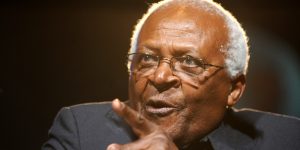Source: en.iranwire.com

Archbishop Desmond Tutu is one of five Nobel Prize laureates to endorse the Education is Not A Crime campaign
Archbishop Desmond Tutu, the South African anti-apartheid hero who received the Nobel Peace Prize in 1984, is one of five Nobel laureates to endorse the new Education Is Not A Crime campaign. His fellow laureates – Dr Shirin Ebadi, Mairead Maguire, Jody Williams, and Tawakkol Karman – have also lent their voices to a global cause on behalf of the persecuted Baha’i religious minority in Iran.
“The Iranian government says that education is a crime for Baha’is,” Archbishop Tutu said. “We can tell the government of Iran, and the world, that banning the Baha’is or any group from higher education is hurting Iran and the Iranian people.”
The endorsements come ahead of a high-profile event, Education and its Discontents, to be held in Los Angeles on 27 February. The event is part of the Education Is Not A Crime campaign, launched in 2014. The campaign raises awareness of the situation for Baha’is in Iran, and, in particular, their deliberate exclusion from the Iranian higher education system. The actor Rainn Wilson, who won several Screen Actors Guild Awards for his portrayal of Dwight Schrute in The Office and Arthur Martin in Six Feet Under, and who also won an Emmy nomination, will emcee the event. Wilson will be joined by pop star Andy Grammer, jazz legend Arturo Sandoval, and musical impresario KC Porter, as well as other American and Iranian musicians and actors, to promote the campaign.
Education Is Not A Crime has also won endorsements from a number of other artists and intellectuals, including Nazanin Boniadi, Abbas Milani, Mohsen Makhmalbaf, Azar Nafisi, Omid Djalili, and Eva LaRue, and the Iranian reformists Mohammad Nourizad and Mohammad Malaki, and has attracted social media support from the actor Mark Ruffalo.
Iran’s government bars Baha’is from teaching and studying at university because of their faith. In his October 2014 report, the UN special rapporteur on human rights in Iran stated that the Baha’is, as an unrecognized religious minority, do not enjoy access to higher education. Hundreds of Baha’is are denied entry to university every year despite meeting the academic requirements. And those Baha’is who manage to gain places are later expelled.
The Baha’is are Iran’s largest religious minority, with at least 300,000 adherents in the country. Seven million non-Iranian Baha’is also live around the world. Iranian Baha’is have been targeted by the country’s religious leaders since the religion emerged in Iran in the mid-19th century. The faith’s post-Islam origins, and its key principles of universal education, the equality of men and women, and non-violence, challenge the ruling conservative clergy.
The government’s policy of barring Baha’is from university has been in place since shortly after the 1979 Islamic Revolution. Baha’i students were expelled and a number of prominent Baha’i academics were dismissed from their university positions.
Iranian Baha’is responded to the situation by creating the Baha’i Institute for Higher Education (BIHE) in 1987. The BIHE is an informal educational initiative designed to give young Baha’is a chance to study. Thirty-two university-level courses across five faculties are on offer, taught by volunteer lecturers and academics. Study is undertaken in people’s homes, by correspondence, and online. A number of Baha’i and non-Baha’i instructors from around the world have joined those in Iran who offer their time.
Iran’s authorities have routinely tried to suppress the BIHE – and often violently, including raids in 1998 and 2011, during which homes were ransacked, materials confiscated, and individuals arrested. Thirteen teachers and students are currently in jail for their BIHE work.
February’s LA event, to be held at the fashionable Ace Hotel in the city’s downtown area, will feature music, dramatic monologues based on first-hand personal testimonies, and exclusive interviews with those who have witnessed the Iranian authorities’ brutal treatment of the Baha’is.
Education Is Not A Crime was inspired by the 2014 documentary film To Light a Candle by Maziar Bahari, the documentary producer and the subject of Jon Stewart’s film Rosewater. Bahari’s film focuses on two brothers, Kamran and Kayvan Rahimian, who studied and later taught at BIHE. Their father was imprisoned, tortured and killed by the regime at the beginning of the revolution for sheltering other Baha’is and for not converting to Islam.
The story of the Rahimians, emblematic of the wider Iranian Baha’i experience, will be at the heart of the Education and its Discontents event on 27 February. To Light a Candle will also be screened at hundreds of locations around the world on the same day.
February 1, 2015 1:43 am
Question: Does Iran bloc Teleconference? We do that for Feasts as we are the only Baha’is in our town in Alaska.
February 1, 2015 6:28 am
Dear Leonard, you might one to double-check with a Bahai in Iran but as far as I know Skype is not blocked or filtered in Iran.